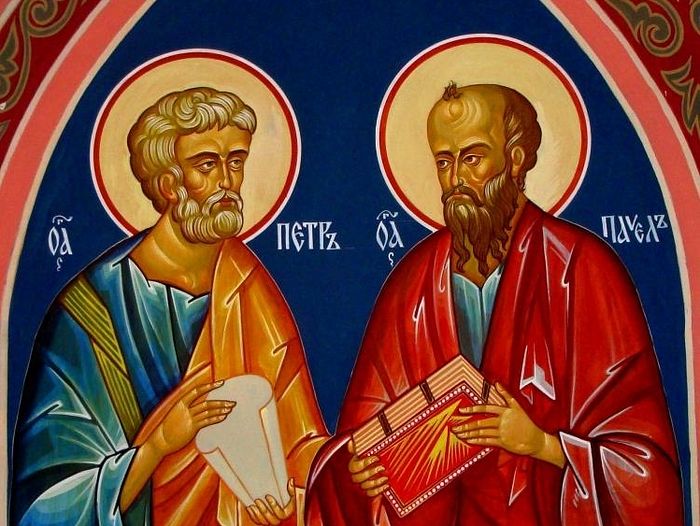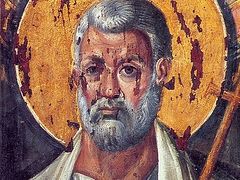The Church of Christ has united the honoring of Sts. Peter and Paul, the preeminent apostles of Christ and missionaries of the Gospel of God. They were completely different people, but both fulfilled their calling to the glory of God.
Peter was a married fisherman, uneducated, who worked hard on the Sea of Tiberias for many years and was exhausted by the fishing trade with its heavy and often empty nets. He experienced many difficulties, taking blows from the waves of this world on all sides, he was used to hunger, and, lacking any refinement or erudition, he remained a child of the land and sea, with his palms calloused from the ropes.
At the call of Christ God, he cast off everything and followed after Him, giving up his primacy in his family and fishing and following after the Savior, attentively listening to the words coming from the mouth of God. His eyes beheld a mass of miracles, his mind beheld the light of Christ resurrecting people from the dead, he heard the mute talking about the Word, he saw the blind who beheld the Light of the world, he touched the purified bodies of those healed of leprosy, and passed through the school of the sacrificial and vivifying love of the High Priest of eternal healing.
With absolute trust, he followed after Him Who irrevocably changed his life. He was impulsive, indecisive, nervous, and sometimes irascible, but his love for the Teacher prevailed over all his shortcomings. He accompanied the Lord everywhere. Feeling, like a spirit, saturated by the Word, he went in to the daughter of Jairus. He fell to the ground before the Eternal Light on Tabor. He sleepily saw the bloody tears of God in Gethsemane. He promised to stay with Christ until death, advising Him to avoid the Cross and Resurrection for the sake of earthly life. He threw himself into the fray in the night garden and cut off the ear of Malchus.
The seizing of Christ was the end of all his hopes, a complete disappointment. That night, when Christ was tortured and scourged, Peter lost his mind, overcome by fear and despair, and renounced the One Who had received him, swearing that he did not know the One Who knows his life. And then he realized the limitlessness of Christ’s love, and a pulverizing earthquake passed through his soul. He came out hence and bitterly wept over his renunciation.
He suffered terribly together with the beaten One; his soul bled for the crucified One. Everything that was firm within him, attached to life, the land, and the sea, broke on the rock of his heart, drowned in tears. He became nothing so as to make room for the One Who forgives the entire universe. He became an endless weeping for the One Who wipes every tear from every face. For him, who had renounced Him, nothing exists but Christ crucified, beaten, nailed, and put to death for the sake of his salvation.
Then Peter the fisherman truly died and a new life began, where death is paid no heed and Life immortal inhabits men. He was forgiven after his threefold declaration of love, overturning his threefold renunciation, and on the day of Pentecost he became a chalice of the Holy Spirit, pouring out grace upon the Church of Christ. He preached on Pentecost and thousands were baptized in the name of the Most-Holy Trinity. He humbly presided over apostolic meetings. He felt as if his heart were bursting in his chest at the memory of his renunciation. He crucified himself his entire life with this thought of his renunciation from the Creator and conscious that he was unworthy to die like God, he humbly desired to die on a cross upside down, in order to see the Heaven that he had yearned for all his life.
Paul was the complete opposite of Peter. A learned rabbi with an innate Jewish elegance, a genius of the Torah and ferocious defender of the Jewish religion, Paul led Christians to death—that sect that dared to lay claim to all the prophecies of the Covenant. A teacher of theology, a researcher of the prophets, a teacher of the law, Paul was a panacea for any ideological deviation.
He was a witness to the murder of Stephen, watching indifferently as Christians were led to death for the Crucified One, and joined in the persecution of the Galileans. For all the depth of his theologizing, he was ruthless, insidious, self-sufficient, and convinced that the ideological revolt of the Christians needed to be filled with blood. By a Divine miracle, he heard a voice from Heaven, he saw a supernatural Light that blinded him, and he felt upon himself the power of the Living God, Whom he had studied his entire life in an insectarium of targums.1
He understood that Christ is the Church when he heard the words: Saul, Saul, why persecutest thou Me? (Acts 9:4). He realized that every suffering of the Church speaks to the infinite pain of God, that the wounds of the beaten are the wounds of Christ, that every tear of Christians flows through the eyes of God. The depth of his rabbinical education burst open towards Heaven, and he realized that the prophecies are fulfilled in the Messiah. The most ruthless persecutor turned into the most elected apostle and theologian of the mysteries of God.
He was a thorn stabbing into the heart of Jewish unbelief; he scattered the theological delusions of the Talmud into the dust. He left for the desert, to see God through his tears. He went to preach, plowing all of Europe and sowing the word of the Gospel with his own hands. Nothing could stop him in this sacrificial apostolicity: neither persecution, nor severe disease, nor suffering, nor death. Neither death, nor life, nor angels, nor principalities, nor powers, nor things present, nor things to come, Nor height, nor depth, nor any other creature, shall be able to separate us from the love of God, which is in Christ Jesus our Lord (Rom. 8:38-39).
He penetrated into the Gospel and interpreted it like none other. Like a catheter, he pierced into the arteries of the Body of Christ and oxygenated it with the theology of a new cloth, an eternal organism. He was a miracle man, tearing Europe to shreds with all its idols and preparing it for the breaking of bread at Liturgy.
When he spoke in tears, Heaven heard him, because the wounds of the Lord responded with terrible pain in his body and Christ spoke in them. The angels of Heaven froze in their liturgizing when Paul the persecutor began to reveal the secrets of the King. He was weak as a reed, but the power of God dwelt within him. He was short of stature but saw the heights of Paradise. He had a hoarse voice, but everyone froze when he began to speak.
An angel of satan slapped him across the face, but he broke his nets over the entire earth. He himself suffered terribly, but he revealed eternal joy to hundreds of thousands of people. He rebuked both the Jews and the apostles and labored with his hands, making tents, and wrote fervent epistles to everything that had breath throughout the entire world. He was persecuted and beaten in the flesh, but his word spread throughout the universe like a shockwave of God’s grace. Listening to him, people turned away from destruction, burst into tears, and changed their lives and lot in eternity.
Two earthy people who passed through all the sufferings of this world, weak and doubting, with heavy sins on their conscience, but who were able through tears and repentance to tear themselves out of the darkness and make of themselves sacred chalices of the mystical Liturgy of Christ. Martyrs and apostles, they spent their entire lives, deaths, and eternity laboring for the sake of Christ—the Love of their lives and the Life of their love. For them, nothing was more important than souls torn from bondage to death for the sake of the promised land. Two Jews with one calling. Two provincials, called to prayer in every corner of the earth.





Please Bless...
Very dramatic and appropriate title: "TWO EARTHQUAKES WITH AN EPICENTER IN PARADISE"
Yes, indeed...
....and a beautiful article. Thank you!
But why do we Orthodox pay these two "Earthquakes for Christ" such short shrift? These men were giants!
Bottom line: Without Sts Peter and Paul we would not have Orthodox Christianity. It's all that simple. How many of us realize that?
Yet - - -
1) There are some modern Orthodox groups who have chosen to omit the Peter and Paul Fast altogether under some conditions;
2) Even the Traditional Orthodox do not specify an "AfterFeast" following the Peter and Paul Fast.
...(... while the lesser commemoration of the Nativity of St John the Baptist, having no Fast, has an "AfterFeast"!)
3) The Festal Meal at the Conclusion of the Peter and Paul Fast, when falling on a Wednesday or Friday, is specified as no different from the exemption for an ordinary Sunday ("Fish, Wine, and Oil" allowed).
WHY? How did we allow all these things to happen?
If these wonderful leading Saints were (and are) indeed the "Earthquakes" who shook the world, how are we not treating them like a minor tremor?
============================